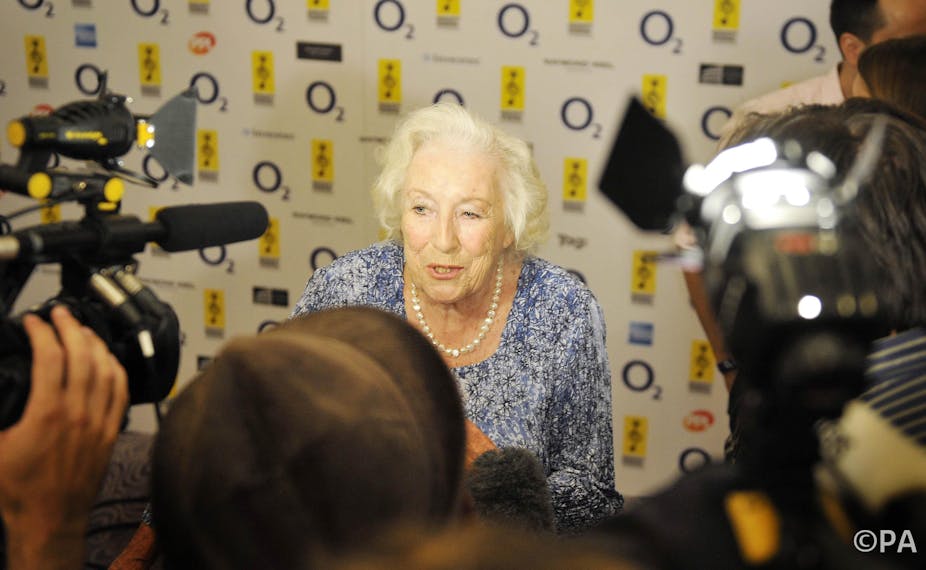Dame Vera Lynn’s latest album, National Treasure — The Ultimate Collection, has been released in the week of the 70th anniversary of the D-Day invasion. The album, filled with over 40 of her wartime hits, is yet another confirmation of her status as a living symbol of the British effort in World War II.
Lynn is remembered as the forces’ favourite, the ordinary East End girl with an extraordinary voice, whose broadcasts over the BBC sustained the nation through the darkest days of the war.
But behind this story is another, more interesting history of wartime broadcasting and stardom. Lynn was an extraordinarily popular performer, but she was more of a controversial figure than we might now imagine. Central to the wartime debates about sentimental music on the BBC, not everyone agreed that her music was good for morale at the time.
At the start of the war, Lynn began recording and touring as a solo performer in Variety. Having come to prominence as a broadcasting dance band singer, she took the microphone with her when she filled the halls as “Radio’s Sweet Singer of Sweet Songs”.
The microphone was key. It allowed singers to use a nuanced vocal palette and remain audible while sing softly. Many perceived this sort of singing — labelled “crooning” — intimate, romantic. Crooners were popular, but they were also accused of being insincere, too American, and (in the case of men) effeminate. Lynn used the microphone and the style, but she kept her clear English diction. With her intense lyrical focus, no one could accuse her of insincerity.
In the autumn of 1940 — during the London Blitz — Lynn’s broadcasting schedule picked up. The BBC had noted her popularity, especially with the forces. She started appearing regularly in Starlight, a 15-minute show that featured a singer “in an intimate setting”. Lynn would arrive at the BBC’s Overseas Entertainment Unit (OEU) studios, in the underground Criterion Theatre, before the Blitz started and then sleep until her rehearsals for the 2:30 am broadcast. Aimed at troops overseas, each Starlight was rebroadcast several times. “Her beautiful voice quality was unmistakable, her fan mail immense,” Cecil Madden, who led OEU, later recalled.
Sincerely Yours
Lynn’s best-known wartime series, Sincerely Yours — Vera Lynn, went on air in late 1941. It differed significantly from Starlight, having dialogue, as well as singing. Structured as “a letter to the men of the Forces from their favourite star”, it was built around Lynn’s girl-next-door persona. It also reached a large home front audience on the Forces Programme, a domestic wavelength created for the troops but heard by a majority civilian audience.
Sincerely Yours was a hit. Throughout its 12 episode run from autumn 1941 to spring 1942, it attracted audiences of more than 20% of the British population. Listening on Sunday nights, after the increasingly grim war news, many were comforted by Lynn’s reassuring dialogue, the weekly lullaby, and hits like “Wishing”.
But the show also became a target for criticism. An influential minority blamed the BBC’s “sickly and maudlin programmes” for significant British losses in North Africa and Southeast Asia. Sentimental popular music, they argued, had a “drugging effect” on the troops and undermined their masculinity and will to fight. Just because Lynn was the “Forces’ Favourite” did not mean she was actually good for their morale.
To help calm this [rather wild criticism", the BBC’s leadership decided to “rest” Sincerely Yours. Lynn, whose career was flourishing, still broadcast, but it was 18 months before she had another solo series.
Crooner bans
The BBC at home also announced a “crooner ban” in July 1942. The new Dance Music Policy Committee was tasked with censoring “slushy” songs, male crooners, and insincere and over-sentimental female singers. Ultimately, the committee banned more than 30 singers and cautioned nearly 60 more. But Lynn remained untouched. By this point she was too popular — and too sincere — to ban.
Meanwhile, Madden and the OEU continued to promote women in broadcasting for overseas troops. Lynn’s radio work became the model for several shows built around “croonerettes” with “girl” producers and announcers. Madden believed that “radio girl friends” had a special ability to connect with overseas forces. Predictably, there was another backlash against crooning and women announcers — but only when their shows reached home audiences in early 1944.
Today, the idea that Dame Vera’s contributions to the nation’s morale were ever questioned seems ludicrous. But the stakes were serious: could popular tastes be trusted? Did women belong on radio? Could a working class girl be taken seriously?
The fact that — at least in Dame Vera’s case — the answer is an unequivocal yes was the result of her talent, artistic vision, and long commitment to her audience. But it is also the result of the complex social legacies of the war.
Her latest album rightly includes Dame Vera’s most iconic songs of the war: We’ll Meet Again, Yours, The White Cliffs of Dover. But the album’s other wartime hits — That Lovely Weekend, Goodnight Children, Everywhere, and others — tell a fuller story. When you listen to the album, look past the icon to the heartfelt performer making thoughtful, and sometime controversial, choices.

